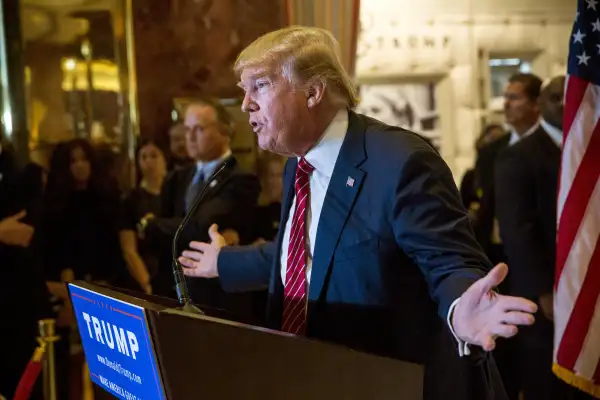Trump's Tax Plan Could Cost $12 Trillion—and Save Him Millions in Taxes Each Year

On Monday, GOP 2016 presidential candidate Donald Trump released a tax plan that promised to eliminate income taxes for more than half of American households and shut down tax deductions and loopholes available to the highest earners.
"My tax plan is going to cost me a fortune," Trump said Monday in a press conference held in New York City's Trump Tower.
But judging from a new analysis from Tax Foundation, a right-leaning policy research center based in Washington, D.C., it seems unlikely that this would be true. His plan would, however, cost the U.S. budget trillions of dollars over a decade.
In a report released Tuesday, Alan Cole of the Tax Foundation wrote that Trump's tax plan, if implemented, would result in a 14.6% rise in after-tax income for the highest-earning 10% of Americans. The top one percent would see a 21.6% bump in after-tax income. Trump, who has reported earnings over an 18-month period of $380 million, is comfortably within that 1%. Depending on his mix of income in a given year, a tax cut that deep could be worth millions to him.
The lowest-earning 10% of Americans, meanwhile, would see their after-tax income increase by just 1.6% under the Trump plan. The second lowest-earning tenth would gain just 0.6%.
The reduced taxes at the top end are largely the result of Trump's plan to deeply cut marginal income tax rates for high earners, from a top rate of 39.6% today to just 25%. Trump's plan also reduces top rates on corporate and business income.
The Tax Foundation also estimated that the plan would cost the federal government $10.14 trillion in tax revenue over the next decade—assuming that the tax cuts spurred some additional economic growth. Assuming growth doesn't change, the bill is $11.98 trillion.
This cost estimate—which places the cost of the tax plan at well over half of our current $16 trillion national debt—far exceeds those made by the Tax Foundation for plans released in recent months by GOP hopefuls Jeb Bush, Marco Rubio, and Rand Paul. They were $3.66 trillion for Bush, $4 trillion for Rubio, and $3 trillion for Paul.
There are caveats to the Tax Foundation estimates. Trump says his plan would be paid for by reducing certain deductions, exemptions, and loopholes used by corporations and high income investors. Such reductions might change the overall cost of the plan, or the specific impact on an individual like Trump. The Tax Foundation says it was unable to precisely incorporate all of these assumptions, because the plan doesn't specify them. However, it also says that none of these provisions would have "nearly the impact of the rate reductions."